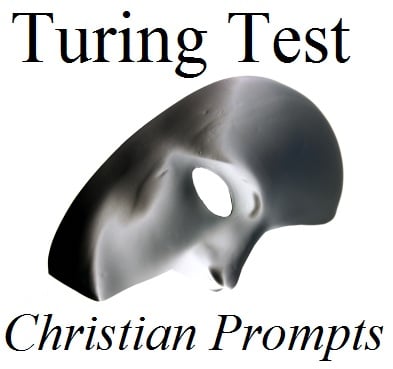This is the fifth entry in the Christian round of the 2013 Ideological Turing Test. This year, atheists and Christians responded to questions about sex, death, and literature.
Polyamory
“Is there any reason that marriage (civil and or sacramental) should be limited to the union of two persons?”
Yes for both Civil & Sacramental Marriage (opposing both), though for different reasons. I’ll expand on Civil Marriage first. The state recognizes marriage through privileges for people who are ‘married’ in the eyes of the law for the purposes of raising a family. A man wants to live with another man and raise a family, that’s not an issue for the law. It’d be inappropriate for the state to differentiate here. However if a man wants to live with 2 women or 4, he’s free to do so, but legally it becomes more complex. We don’t have a mechanism for splitting marital assets between more than 2 people. How would survivor benefits work? Would wife #1 get as much as wife #4? Could giving legal status to this situation make fraud easier? The idea of a 2 person marriage is embedded too deeply in our law to open it up to legally recognizing polyamorous relationships.
Sacramental Marriage is a simpler situation. The promises of a Sacramental Marriage are more than just lip service in front of family and friends or the signing of a legal document. Sacramental Marriage is a covenant relationship between a man, a woman and God, formed for the purpose of procreation. The authority that grants a Sacramental Marriage is beyond the reach of the state and granted according to God’s own standards, and those standards are clear on what is, and what is not Sacramental Marriage.
“If your answer depends on religious revelation, could people outside your tradition reasonably disagree, or does your argument depend on truths that almost everyone can acknowledge”
People get on together best when they don’t impose themselves on their neighbors, nor that their neighbors impose on them. My own feelings on homosexual or polyamorous relations don’t pass the smell test for legally telling people how they should be behaving, though I remain opposed to polyamorous Civil Marriage for reasons stated above. Similarly, Sacramental Marriage belongs in God’s sphere, and the laws of that land there, so to speak, are clear. I don’t know if this qualifies as revelation, but it’s the way I see it.
Euthanasia
“When, if ever, is it permissible or even obligatory to end a life?”
With our modern ability to manage pain, I have a tough time buying any instance of it being permissible, let along obligatory, to end a life. Someone lying sick in a bed or claiming they’re just so sad they’d prefer to have someone kill them isn’t in the right frame of mind to make such a decision. There is a potential for a recovery that they couldn’t possibly know one way or the other, and once you’ve moved on you’re on a one-way street. I’ve been fortunate enough not to have had to witness much suffering, especially amongst loved ones who’ve passed. Were someone’s pain to be beyond acceptable management, and I’ll admit an ignorance in this area, I might be more flexible in my views.
There’s also the issue that once we would legalize the ending of life in that manner, that people would be pressured to do it. This is unacceptable, even if it’s only in subtle ways. We owe our neediest people better than that.
“Is there a difference between intervening to kill and simply not administering medical treatment that might prolong life?”
Yes, the latter is leaving the matter to God’s judgement who might just make a decision that would surprise you. The former makes the claim you know how matters will unfold.
You can vote on whether you think these answers were written by a Christian or an Atheist here. Comments are open to discuss the substance of the post and for speculation about the true beliefs of the author, so please vote before looking at the comments.












